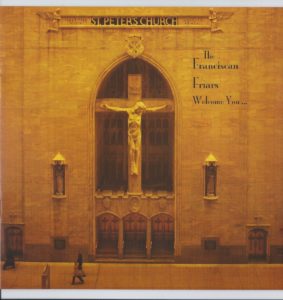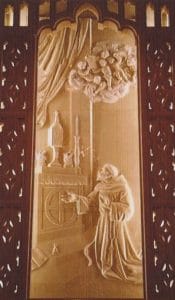Contemplate another collaborative Franciscan Gospel post this Francis Feast Week. This weekly Sunday Gospel reflection and questions are written by Fr. Paul Gallagher, OFM. They are edited by Sister Anne Marie Lom, OSF and Joe Thiel. The excerpts from the Sunday readings are prepared by Joe Thiel. If you would like to read or download the complete pdf with excerpts for your prayer, please click here: Franciscan Gospel Reflection October 1 2017 Excerpts from the Lectionary for Mass for Use in the Dioceses of the United States of America, second typical edition © 2001, 1998, 1997, 1986, 1970 Confraternity of Christian Doctrine, Inc., Washington, DC. Used with permission. All rights reserved. No portion of this text may be reproduced by any means without permission in writing from the copyright owner. Please include this information when printing.
Photos: St. Peter in the Loop Church, Chicago
Matthew 21:28-32
[Jesus said to the chief priests and elders of the people:] “What is your opinion? A man had two sons. He came to the first and said, ‘Son, go out and work in the vineyard today.’ He said in reply, ‘I will not,’ but afterwards he changed his mind and went. The man came to the other son and gave the same order. He said in reply, ‘Yes, sir,’ but did not go. Which of the two did his father’s will?” They answered, “The first.” Jesus said to them, “Amen, I say to you, tax collectors and prostitutes are entering the kingdom of God before you. When John came to you in the way of righteousness, you did not believe him; but tax collectors and prostitutes did. Yet even when you saw that, you did not later change your minds and believe him.
Background
In the final line of last week’s gospel, Jesus declared that the last will be first and the first will be last. (Matthew 20:16) As Matthew unfolds his gospel, he next describes the following sequence of events. Jesus makes his third and last prediction of his suffering and death. The mother of James and John petitions Jesus that her sons sit at his right and left when he enters his Kingdom. The other ten disciples become indignant at the request. Jesus then addresses all the disciples, instructing them by contrasting the usual use of authority with his own understanding; Jesus declares that greatness is found in those who desire to serve. The 20th chapter of Matthew’s gospel ends with the account of Jesus healing a blind man outside the town of Jericho.
The 21st chapter of Matthew begins with Jesus entering Jerusalem riding a donkey and the crowds crying out “Hosanna to the Son of David.” Jesus enters the temple area and overturns the tables of the moneychangers and those selling doves to the pilgrims for offerings. The chief priests and the scribes confront Jesus. The following morning, as Jesus enters Jerusalem, he curses a fig tree because it hasn’t borne fruit and it dies immediately. As Jesus is teaching in the temple area, the chief priests and the elders question his authority to teach. Jesus says that he will respond to their question if they will answer a question for him. From where did John the Baptist get his authority? No matter how they answer him, they will bring embarrassment upon themselves, so they refuse to respond. This dialogue leads into Jesus telling the parable that is the text for today’s gospel.
Stories about two sons were a common way of making a point. The stories of Cain and Abel (Genesis 4:1-16) and Jacob and Esau (Genesis 25:23-27:46) are familiar. The prophet Ezekiel tells the story of two sisters Oholah and Oholibah who represent Samaria and Jerusalem in his story. (Ezekiel 23:1-49) In the gospel, the son who refuses to go to work in the vineyard has broken with accepted norms of behavior and insulted his father, who would typically have the legal right to punish him and even put him to death.
Jesus is very shrewd in the way he phrases the question he puts to the chief priests and the elders. He does not ask which son has honored his father. People of the day valued honor more than obedience. To their thinking the son who only said he would work in the vineyard was more honorable than the one who said he would not. (There are no private conversations in this culture.) But Jesus has asked who actually did what the father asked of him. Jesus is suggesting that they are like the first son, who in appearance says that right thing, but whose actions are lacking. In fact, their maintaining a virtuous appearance prevented them from responding with care and compassion to the needs of the sinners and those on the fringe. Jesus does not say that they will not enter heaven, but he does say that tax collectors and sinners will enter before them. Many of the sinners were baptized by John, and changed their lives. Many of the religious leaders were also baptized by John, but they had not changed their lives. As a result, the respect they so sought to maintain on earth will not be mirrored in heaven.
Reflection Questions
1. Do you remember an occasion when it was impressed upon you the need to respect your elders?
2. Are you aware of a time when you were concerned about saying the right things and doing the right things in order to impress another?
3. As years pass, are you finding yourself more tolerant of the flaws in those around you?
4. Are you becoming more aware of your own need for conversion?
5. What is it like for you to go to confession?
6. What does the fact that the Church makes the sacrament of reconciliation available without limit say to you about the Church’s understanding of the human condition, and her understanding of the desire of God?
7. Where are you in this gospel text? Are you one of the people Jesus is addressing with the parable? Are you one of the sons? Are you one of the by-standers watching the dialogue unfold between Jesus and the elders?
8. Can you take some time to talk with God about your experience of this short dialogue?


